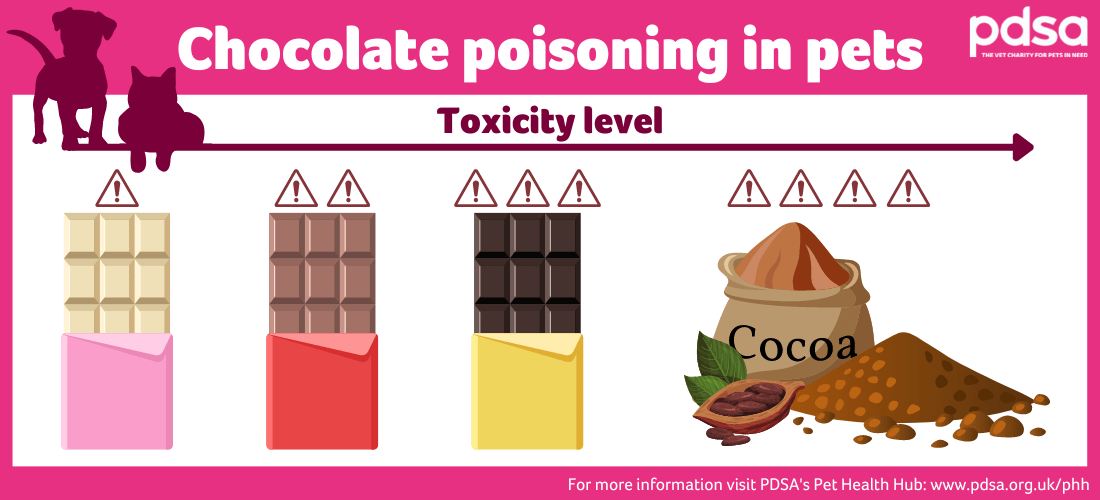Chocolate poisoning in dogs
Overview
- Chocolate contains a substance called theobromine, which is perfectly safe for humans, but toxic for dogs, cats and rabbits.
- The seriousness of chocolate poisoning depends on how much chocolate your dog has eaten, how big they are, and the cocoa content of the chocolate – the darker the chocolate the more toxic it’s likely to be.
- If your dog has eaten chocolate, keep the packaging and call your vet immediately.
 Video found at youtu.be/eu0Znxvvl4c
Video found at youtu.be/eu0Znxvvl4c
Dogs should never be given chocolate. Chocolate is made with cocoa solids, which contain a substance called theobromine. Theobromine is harmless to humans, but toxic to dogs and other pets because they struggle to metabolise it (break it down). Chocolate can also contain a small amount of caffeine which can be harmful to pets.
As a general rule, the darker the chocolate, the more cocoa solids/theobromine it will contain and the more toxic it’s likely to be. However, even chocolate with less cocoa solids can be toxic if enough is eaten. Although white chocolate doesn’t contain any cocoa solids (so toxicity isn’t a risk), it does contain a lot of fat and sugar, which can cause stomach upsets and in severe cases, pancreatitis. Cocoa powder is especially toxic because it contains an extremely high concentration of cocoa solids.

Theobromine is a similar substance to caffeine and if it’s ingested at a toxic dose, it can cause the nervous system, guts, and muscles to go into overdrive. This typically causes symptoms such as:
- Excitement, restlessness, agitation and hyperactivity
- Diarrhoea
- Vomiting
- Drinking and weeing more than usual
- Abdominal (tummy) pain
Symptoms of chocolate poisoning usually appear within two to four hours but can take up to 12 hours. In severe cases, toxicity can cause:
- Fast breathing or panting
- Shaking, trembling and tremors
- High temperature (fever)
- Seizures
- A fast heart rate
- High blood pressure
This is very rare, but the most severe cases of chocolate poisoning can lead to heart failure, coma and even death.
When to contact your vet
If you suspect your dog may have eaten chocolate, don’t wait for symptoms to appear. You should immediately call your veterinary practice or the ‘Animal Poison Line’ for advice. You will need to tell them the type of chocolate, how much they ingested, the size of your pet, and when it happened. As a first step, for dogs, you could also check out the dog chocolate toxicity calculator below.
Treatment
If your dog has eaten a toxic dose of chocolate it’s important that they are seen by a vet as soon as possible. The treatment they need will depend on how much/what type of chocolate they have eaten. Common treatments include:
- Induced vomiting – if you can get your dog to the clinic within a few hours of them eating the chocolate, your vet might give them an injection to make them sick. Don’t try to make your dog sick at home.
- Activated charcoal – your vet may give your pet some activated charcoal to absorb any remaining toxins, and they might give you some to continue giving at home.
- A fluid drip – depending on how much chocolate your dog has eaten, and the seriousness of their condition, they may need a fluid drip to support their vital organs and prevent them from becoming dehydrated while their body flushes out any toxins.
- Sedation – if your dog is suffering from severe symptoms such as tremors and seizures, they may need to be sedated to stop them from getting worse.
- Close monitoring – if your vet decides to keep your dog in the hospital, they will monitor them closely and ask you to do the same once they are home. It’s important that you contact your vet for advice if your dog deteriorates.
Prevention
- Never feed chocolate to your pets (make sure any children in the house also know about this).
- Keep all chocolate, and chocolate-containing products, out of reach by storing them in high or locked cupboards.
- Be particularly careful at festive times such as Easter, Christmas and other events that involve chocolate.
- Try to keep your pet away from post and parcels – you never know when someone might send you a chocolatey treat!
- Avoid using gardening mulches that contain cocoa shell.
Cost
What an expensive snack! Treatment for chocolate poisoning can cost hundreds of pounds (depending on the treatment needed). Consider insuring your pet as soon as you get them (before any problems develop), to ensure you have the financial support you need if they become unwell. It’s also very important to speak to your vet if you can’t afford the treatment they have recommended because there may be other options.
Published: January 2023
Did you find this page useful?
Tell us more
Please note, our vets and nurses are unable to respond to questions via this form. If you are concerned about your pet’s health, please contact your vet directly.
Thank you for your feedback
Want to hear more about PDSA and get pet care tips from our vet experts?
Sign up to our e-newsletter
Written by vets and vet nurses. This advice is for UK pets only. Illustrations by Samantha Elmhurst.

